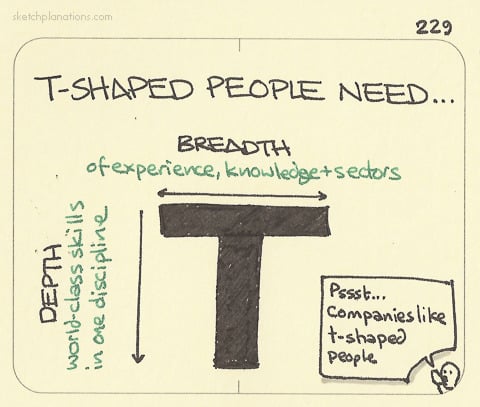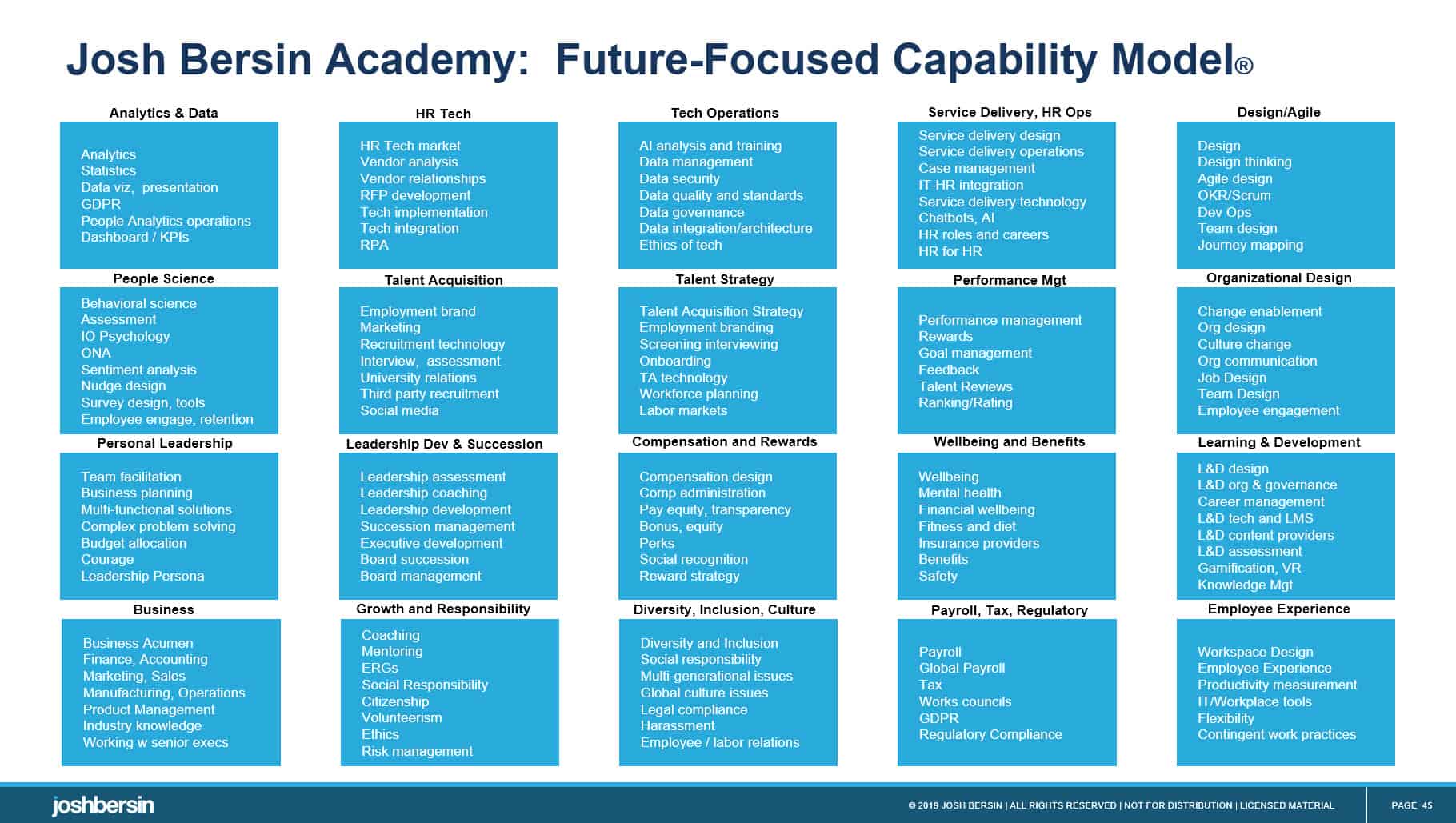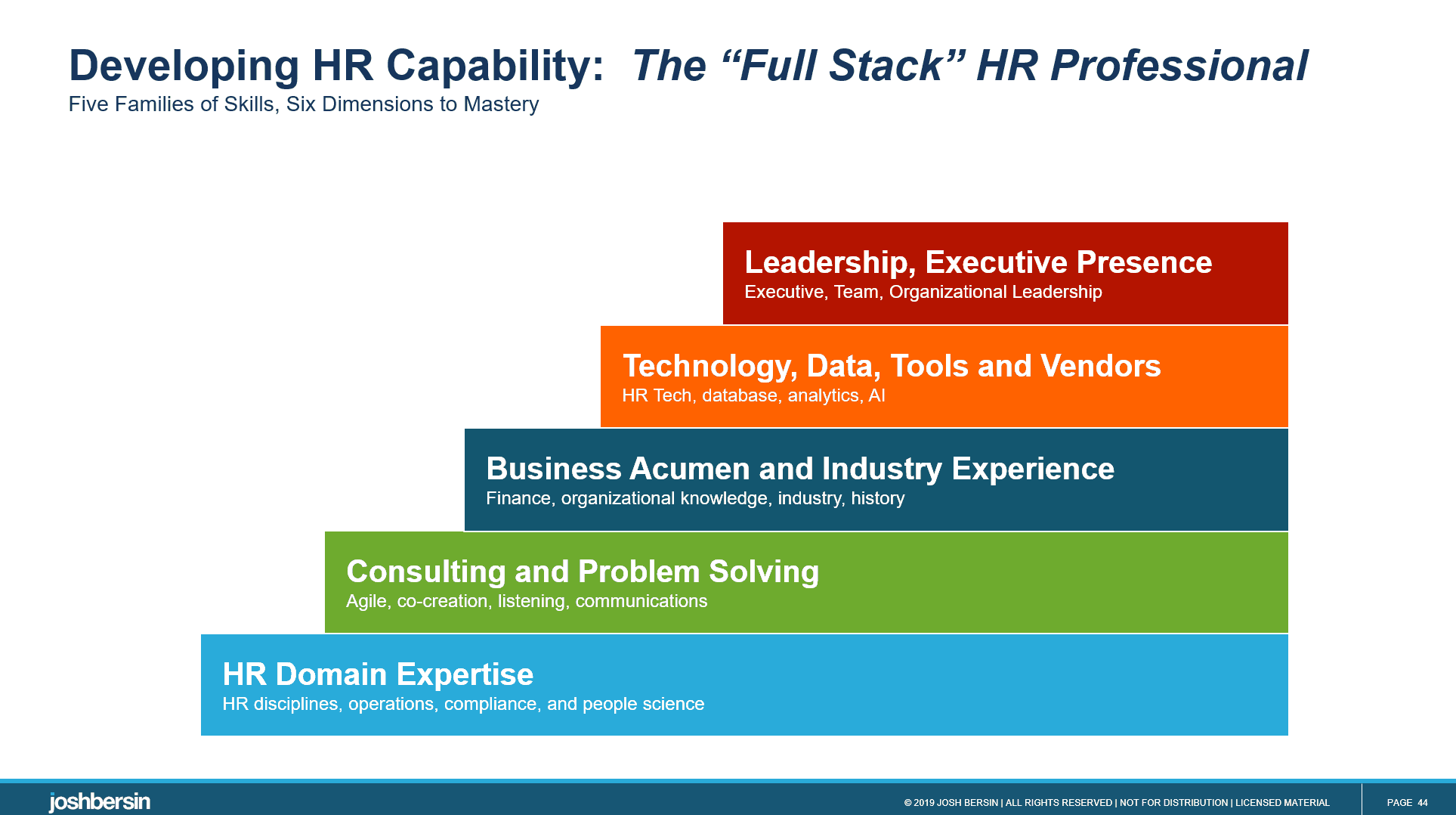The Full-Stack HR Professional
In software development, there is a concept of the “full-stack engineer,” someone who knows hardware, operating system, database, applications, user interface, design, and mobile applications. These magic individuals are among the most valued in business: they can architect new systems, debug the most difficult problems, and serve as big thinkers for technologists everywhere.
I believe we now need the same thing in HR, Full-Stack HR professionals. While specialization is still critical to your career success, building what is often called a “T-Shaped” career is the future. Let me explain.
 |
In all aspects of our lives, there is a tradeoff between depth (specialization) and breadth (perspective). By focusing and developing expertise, you learn to leverage your strengths, you add ever-increasing amounts of value, and you can create an identity and become well known. But as many studies now show (I particularly like the book Range: While Generalists Triumph In A Specialized World), it is the combination of depth and breadth that matter.
(This book makes a compelling case that specialists fall behind generalists over time, and that the highest performing people in sports, business, and the arts are always increasing their depth and range at the same time. They specialize, but only after they have done many things and learned how the world fits together.)
Steve Jobs often talked about the marriage of technology and humanities, and how Apple’s real genius was not engineering, but rather using engineering to solve day to day human problems. This is precisely what we do in HR. We rely on a deep well of technical domain expertise to solve some pretty amazing problems in organizations, business, and in teams. And this is my new mission in life: to help HR professionals at all levels develop these T-Shaped “full stack” capabilities, so you can add even more value to your organization than ever.
The Full-Stack HR Professional
I came to this realization after spending almost a year trying to build a “capability model” for HR. We developed the model (it’s available in the Josh Bersin Academy), and it became a very large model with more than 80 different capability areas. And each one was complex and deep in its own, resulting in hundreds of things to learn, develop, and study.
What I realized after looking at it, however, and as we worked on the curriculum we’re building in the JBA, is that there really is a “stack” of skills you need to become a high-powered HR leader. And in today’s talent-driven companies, you have to learn them all – because every solution you build is adjacent and dependent on something else.
Consider the job of recruiting. You could be an expert recruiter, but if you don’t understand assessment, bias, and the legal minefields of recruiting your job is limited. And once you become a “full-stack” talent acquisition professional, you realize that all these skills also apply to internal mobility, career development, and job rotation (all a form of internal recruitment). And then you realize you have to understand compensation strategies and why people should get a raise when they change roles but may not get a promotion.
Get it? Everything is now related.
While we have to be specialists in one thing, we also have to be generalists in many. And as HR becomes more a job of “experimenting and developing” solutions, not just copying the solutions of others, these hybrid skills are more important than ever.
By the way, the concept of “hybrid skills” has hit the software and engineering professions hard. Research by Burning Glass Technologies over the last few years has shown that “full stack” or “hybrid” roles are 30-50% more valuable than specialist roles in software. The same thing is happening to us.
What Is The Stack for HR Professionals?
Let me try to explain our stack.
Fundamentally, of course, we must know the technical domains of HR. And there are a lot. Here is the capability model we developed, which now has more than 7,000 users. You can assess yourself or your organization here.
 |
As you can see, they range from deeply HR topics to business, management, culture, regulatory, and many areas of technology. I’d suggest that over time you end up learning something about all of them, so the width of the “T” in HR is broad. And it’s very clear to me today, the more of these domains you understand, the more useful and powerful you will be.
So the first thing to do in your professional development is to become curious about all these things. Over time our programs and resources in the JBA are designed to expose you to everything, and you can learn much more by taking new assignments, working on cross-domain projects, and just asking questions at work.
But beyond these topics, what really makes you succeed over time? The real “stack” of HR falls into five categories, and I’d suggest they look like the picture below.
 |
First, as shown in the bottom, are the real technical domains of HR. These are the disciplines you must understand, and you can learn them from books, academic courses, articles, and resources like our academy. Over time you will learn to specialize in one domain (recruiting, learning, compensation, executive development, coaching, etc.) and this can become the vertical bar of your T.
Second, and equally as important in your professional role, is your expertise as a consultant, problem-solver, and listener. The reason HR exists is to help people and organizations thrive: we cannot invent or design solutions in a vacuum. In every case I’ve studied it’s the alignment and subtle “soft corners” of a strategy that make it work, and this means you are a consultant above all else. I’ve worked with some amazing consultants, and they have deep skills in listening, empathy, and figuring out how much change a team or company can take. Every HR business partner (our new Strategic HR Business Partner program dives into this) needs this type of expertise.
Third, you must develop expertise in business, your company, and your industry. This is not as simple as “business acumen” as many people call it: you should be reading the Wall Street Journal, keeping up on product, technology, and market dynamics in your industry. You need to know how your company makes money, and how operations like research, sales, marketing, manufacturing, and finance work together. This is why the best HR professionals spend time in non-HR roles: they learn what’s really going on, and then can come back to HR and add even more practical value.
Fourth, you must understand the tools and technologies of our profession. There are no HR solutions that don’t involve platforms, technologies, and data – so you need to know what these tools are, understand basically how they work, and have an avid and ongoing interest in staying current on this market. It used to be true that HR Technology was a sub-specialty of HR. Today it’s something we all need to understand, and you can build a deep expertise in this also if it interests you. (There is a bigger need for HR Tech architects than ever before, so specializing in HR tech is fantastic. The HR Tech Workshop program to really get under the covers.)
Think about an expert carpenter. Not only does she have to understand wood, design, and the trade of carpentry: she has to know about all the new drills, saws, and machines in their trade.
Fifth, you must have leadership knowledge and experience. Not only do we have to help companies assess, build, and reward leaders, we have to understand why leaders behave like they do, how they make decisions, and what it’s really like to lead. And we have to learn how to engage, convince, and involve business leaders. These skills are like the capstone skills in HR – and if you want to run an HR function, you also need to know how they apply to our function alone.
I won’t spend more time on this here, but this is a huge topic for me in the year ahead. I’ll be publishing my Prediction for 2020 soon and personal reinvention is one of the big themes for the year.
Finally, let me remind you it doesn’t matter where you are today – you can get there from here.
Many of the most successful HR and business professionals I meet started as recruiters, HR generalists, or as salespeople or junior consultants. As long as you think about the “stack” of capabilities you need, you can always fill in your T, making you and your company more successful every day.


